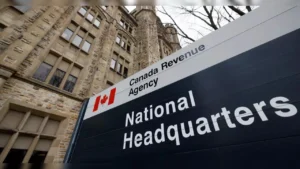According to a poll, the Bank of Canada’s neutral rate maybe 2.75%.

According to a survey released by the central bank on Monday, the financial market anticipates that the Bank of Canada will lower its policy rate to 2.75 percent by June 2025 and then maintain it there for the rest of 2025 and into 2026. Although it hasn’t given a precise objective, the Bank of Canada has stated that its neutral tax rate should be between 2.25 and 3.25 percent. The long-term nominal neutral rate for the survey’s median of 26 replies is 2.75 percent.
Thirty financial market participants participated in the quarterly survey, which was conducted from September 18–27. The central bank has since lowered interest rates by 50 basis points.
The study also gathered market participants’ opinions on the Canadian economy and inflation.
The median of 27 replies predicts that the Canadian economy will increase by 1.5% in 2024 and 1.9% in 2025, with the consumer price index at 2.2% by year-end and 2% in 2025. According to the most recent prediction from the Bank of Canada, growth is expected to be 1.2% this year and 2.1% in 2025.
Because of tax reforms implemented by the federal government, Canada’s tax competitiveness is declining.
The International Tax Competitiveness Index, published annually by the U.S.-based Tax Foundation, rates nations according to how competitive their tax systems are, or how appealing they are to people and businesses in comparison to other economies. More competitive tax systems typically have lower tax rates.
When examining company and personal income taxes in particular, the drop is even more pronounced. Canada placed 24th out of 38 in both categories in 2023, but as of 2024, we are presently in 26th place for company taxes and 31st place for personal income taxes.
What has caused the nation’s tax competitiveness to decline?

First of all, companies can write off (or deduct) a portion of their capital expenditures from their taxes when they purchase items like machinery or equipment. Accordingly, the effective tax rate on capital investments rises as the amount that may be written off in a given year is decreased, as economist Trevor Tombe explains.
Second, half of a capital gain, or income from the sale of an asset, was taxable before the Trudeau administration made this year’s shift. However, the administration raised that “inclusion rate” to two-thirds in several situations in April.
Canada’s economy has not been robust or productive; living standards, as indicated by GDP per person, have been declining for five years, and productivity, which is measured as economic output per hour worked, has decreased in eight of the last nine quarters. In short, our deterioration in tax competitiveness will only exacerbate our economic issues at a time when Canada’s economy is already struggling.
The depressing situation of the economy is partly caused by Canada’s lack of tax competitiveness. The Trudeau administration has exacerbated the issue rather than resolved it. Policymakers in Ottawa and throughout the nation should implement comprehensive tax reform to increase our competitiveness.
“Gutless executives”: Trudeau’s rising opponent shocks Canada’s CEOs

A who’s who of Canadian business elites congregated on the 54th floor of the TD Bank Tower, a massive glass-and-steel structure in Toronto’s financial center. For the opportunity to speak with Pierre Poilievre, the head of the Conservative Party of Canada, several CEOs, tech titans, and bankers had paid up to $1,725 per.
The veteran politician has changed the Conservatives’ relationship with industry and transformed them into a feared political force. The Conservatives have only held power four times since World War II. Genteel pro-business conservatism has been abandoned, just like in Donald Trump’s Republican Party. Pointed criticism of people who disagree with the leader is in.
With an election scheduled for October 2025, the Conservatives have maintained a double-digit advantage in public opinion polling for more than a year. Given the size of the party’s current lead and the seeming weakness of Trudeau’s Liberal Party, predictions indicate the Conservatives might win more than 200 of the 343 Commons seats that are up for grabs.
With such a majority, Poilievre would have the power to drastically alter the course of the tenth-largest economy in the world, and he is implying that this is precisely what he wishes to accomplish.
